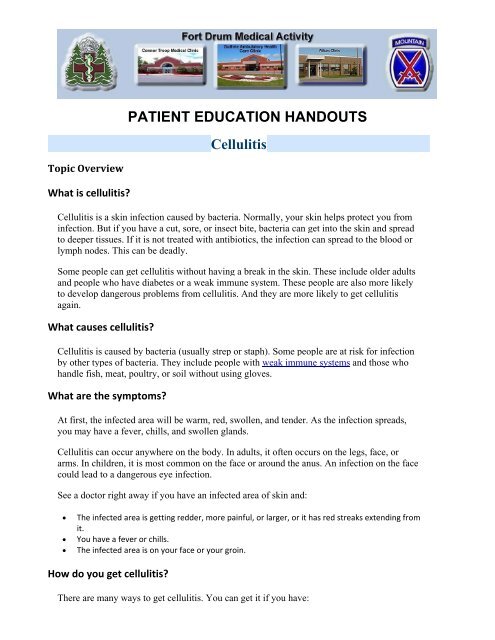PATIENT EDUCATION HANDOUTS Cellulitis
PATIENT EDUCATION HANDOUTS Cellulitis
PATIENT EDUCATION HANDOUTS Cellulitis
Create successful ePaper yourself
Turn your PDF publications into a flip-book with our unique Google optimized e-Paper software.
<strong>PATIENT</strong> <strong>EDUCATION</strong> <strong>HANDOUTS</strong><strong>Cellulitis</strong>Topic OverviewWhat is cellulitis?<strong>Cellulitis</strong> is a skin infection caused by bacteria. Normally, your skin helps protect you frominfection. But if you have a cut, sore, or insect bite, bacteria can get into the skin and spreadto deeper tissues. If it is not treated with antibiotics, the infection can spread to the blood orlymph nodes. This can be deadly.Some people can get cellulitis without having a break in the skin. These include older adultsand people who have diabetes or a weak immune system. These people are also more likelyto develop dangerous problems from cellulitis. And they are more likely to get cellulitisagain.What causes cellulitis?<strong>Cellulitis</strong> is caused by bacteria (usually strep or staph). Some people are at risk for infectionby other types of bacteria. They include people with weak immune systems and those whohandle fish, meat, poultry, or soil without using gloves.What are the symptoms?At first, the infected area will be warm, red, swollen, and tender. As the infection spreads,you may have a fever, chills, and swollen glands.<strong>Cellulitis</strong> can occur anywhere on the body. In adults, it often occurs on the legs, face, orarms. In children, it is most common on the face or around the anus. An infection on the facecould lead to a dangerous eye infection.See a doctor right away if you have an infected area of skin and:• The infected area is getting redder, more painful, or larger, or it has red streaks extending fromit.• You have a fever or chills.• The infected area is on your face or your groin.How do you get cellulitis?There are many ways to get cellulitis. You can get it if you have:
• An injury to your skin, such as a cut, surgical wound, burn, or animal or insect bite.• Skin problems, such as ulcers, eczema, psoriasis, or a fungal infection like athlete's foot.• Certain medical conditions. These include diabetes, peripheral arterial disease, or a weakimmune system.• Fluid buildup (edema) in the legs or arms.• Had liposuction to remove excess fat.• Injected illegal drugs under your skin.How is it treated?Doctors use antibiotics to treat cellulitis. If the infection is mild, you may be able to takeantibiotic pills at home. If the infection is severe, you may need to be treated in the hospitalwith antibiotics that go right into your bloodstream.If your doctor prescribes antibiotics, it is important to take them as directed. Do not stoptaking them just because you feel better. You need to take the full course of antibiotics.It is very important to get treatment right away for cellulitis. If it is not treated, the bacteriacan spread quickly through the body and cause sepsis, an extreme response by the body’sdefense system. This can be deadly. <strong>Cellulitis</strong> on the face can spread to the brain and cause adangerous infection (meningitis). <strong>Cellulitis</strong> can also cause other serious problems, such asblood clots in the legs (thrombophlebitis).You are more likely to have these problems if you are an older adult, have a medicalcondition such as diabetes or peripheral arterial disease, or have a weak immune system.Your chances of the cellulitis coming back may be higher too.How can you prevent cellulitis?If you are at risk for cellulitis, you can take steps to help prevent it.• Take good care of your skin. Keep it clean, and use lotion to prevent drying and cracking.• Check your feet and legs often. This is especially important if you have diabetes.• Treat any skin infection, such as athlete’s foot, right away.• Ask your doctor if you need to take antibiotics on a regular basis to prevent cellulitis.• If your doctor prescribes medicine, take it just the way your doctor says to.Frequently Asked QuestionsLearning about cellulitis:Being diagnosed:Getting treatment:Ongoing concerns:• What is cellulitis, and what causes it?• What increases my risk of cellulitis?• What are typical symptoms?• How is cellulitis diagnosed?• How is cellulitis treated?• How can I care for cellulitis at home?• How can I keep cellulitis from coming back?
Author: Robin Parks, MS Last Updated: March 22, 2007Medical Review: Kathleen Romito, MD ‐ Family MedicineRandall D. Burr, MD ‐ Dermatology_________________________________________________________________________________________________Reviewed 9 June 2008
















